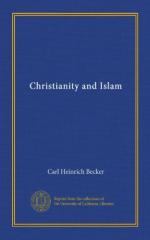poverty and renunciation of personal property:
this is the great Christian ideal. Muhammed was
neither poor nor without possessions: at the
end of his life he had become a prince and had directly
stated that property was a gift from God. In spite
of that his successors praise poverty and their praises
were the best of evidence that they were influenced
not by the prophet himself but by Christianity.
While the traditions are full of the praises of poverty
and the dangers of wealth, assertions in praise of
wealth also occur, for the reason that the pure Muhammedan
ideas opposed to Christianity retained a certain influence.
J. Goldziher has published an interesting study showing
how many words borrowed from this source occur in
the written Muhammedan traditions: an almost complete
version of the Lord’s Prayer is quoted.
Even the idea of love towards enemies, which would
have been unintelligible to Muhammed, made its way
into the traditions: “the most virtuous
of acts is to seek out him who rejects thee, to give
to him that despises thee and to pardon him that oppresses
thee.” The Gospel precept to do unto others
as we would they should do unto us (Matt. vii. 12,
Luke vi. 31) is to be found in the Arab traditions,
and many similar points of contact may be noticed.
A man’s “neighbour” has ever been,
despite the teaching of Jesus, to the Christian and
to the Muhammedan, his co-religionist. The whole
department of Muhammedan ethics has thus been subjected
to strong Christian influence.
Naturally this ecclesiasticism which dominated the
whole of life, was bound to assert itself in state
organisation. An abhorrence of the state, so
far as it was independent of religion, a feeling unknown
in the ancient world, pervades both Christianity and
Muhammedanism, Christianity first struggled to secure
recognition in the state and afterwards fought with
the state for predominance. Islam and the state
were at first identical: in its spiritual leaders
it was soon separated from the state. Its idea
of a divine polity was elaborated to the smallest
details, but remained a theory which never became
practice. Yet this ideal retained such strength
that every Muhammedan usurper was careful to secure
his investiture by the Caliph, the nominal leader
of this ecclesiastical state, even if force were necessary
to attain his object. For instance, Saladin was
absolutely independent of the nominal Caliph in Bagdad,
but could not feel that his position was secure until
he had obtained his sultan’s patent from the
Caliph. Only then did his supremacy rest upon
a religious basis and he was not regarded by popular
opinion as a legitimate monarch until this ceremony
had been performed. This theory corresponds with
constitutional ideals essentially Christian. “The
tyranny,” wrote Innocent IV to the Emperor Frederick
II, “which was once generally exercised throughout
the world, was resigned into the hands of the Church
by Constantine, who then received as an honourable




